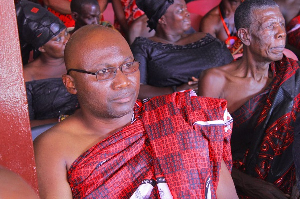- Home - News
- TWI News | TV
- Polls
- Year In Review
- News Archive
- Crime & Punishment
- Politics
- Regional
- Editorial
- Health
- Ghanaians Abroad
- Tabloid
- Africa
- Religion
- Election 2020
- Coronavirus
- News Videos | TV
- Photo Archives
- News Headlines
- Press Release
General News of Thursday, 16 March 2006
Source: GNA
CHRAJ says it has jurisdiction to investigate allegations against Anane
Accra, March 16, GNA - The Commission on Human Rights and Administrative Justice (CHRAJ) on Thursday overruled a preliminary objection that it had no jurisdiction to investigate Dr Richard Anane, Road Transport Minister, because there was no formal complaint in the matter.
Overruling the objection, the Commission said it was vested with jurisdiction to proceed with its investigations into the allegations although no formal complaint had been lodged by a complainant. The Commission pointed out that since CHRAJ was essentially an investigative body and not a court, it may investigate matters on its own volition and did not, therefore, have to wait for a complaint to be brought before it. It said it, therefore, had the responsibility to conduct preliminary investigations which it had done before proceeding to a full-scale investigation.
Dr Anane is being investigated for certain allegations of corruption and conflict of interest against him. The Commission stated that since its inception in 1995, it had instituted corruption probes against public officers on the basis of newspaper allegations, and had since then developed practice and precedent. For this reason, the Commission pointed out, it would defeat the purpose and intent of the Constitution if it sat idly by, waiting for complaints, while allegations had been made in the media and in the public that constituted notice to the entire world. The Commission stated that experience from its inception to date had shown that such allegations merited, at the very least, investigations, even if those allegations were not eventually borne out at the conclusion of investigations.
CHRAJ said the notice of allegations in Dr Anane's case was the result of its preliminary investigations. Therefore, to say that these allegations should not be investigated because they were not brought by any identifiable individual was an exercise in sophistry and denial. In the case under investigations, the Commission noted that it would be absurd to investigate matters relating only to the allegations, and ignore instances of abuse of office which arose from the exact same set of facts on the basis that they were not the subject of a formal complaint formally lodged before the Commission.
The Commission said as an investigative body, therefore, it was duty bound to follow where the evidence led. It added that it would be highly hypocritical, injurious, and indeed defeat the constitutional guarantee of fundamental human rights and administrative justice, if it was dissuaded from or failed to investigate the matter for the simple reason that no formal complaint had been lodged. Concluding, CHRAJ said the Minister was being given the chance to clear himself and establish his good name and reputation through a process which, in the Commission's view, was open, obviously transparent and fair. The Commission felt the preliminary legal objection raised by Counsel for the Minister was unmeritorious and, therefore, dismissed it accordingly.
On February 7 2006, Mr Jacob Acquah-Sampson, lead counsel for Dr Anane, raised a preliminary objection challenging CHRAJ's jurisdiction to proceed with its investigations into allegations of corruption and conflict of interest against the Minister. Counsel questioned the propriety of the procedure adopted by the Commission in carrying out its constitutional mandate. The crux of Counsel's objection was that CHRAJ had no jurisdiction to proceed with this investigation without the lodging of a formal complaint under the provisions of the 1992 Constitution. Counsel argued that the essence of receiving a formal complaint lodged by an identifiable complainant was a precondition without which the Commission could not proceed to cause any investigation to be conducted into any matter under its mandate.
Dr Philip Bondzi-Simpson, Counsel for the Commission had asked the three-member Investigative Panel, to dismiss the preliminary objection on the grounds that the argument that CHRAJ could not proceed in the absence of a specific complainant and a formal complaint, was not supported by the Constitution. Following a petition to the Parliamentary Select Committee on Vetting submitted by Mr Raymond Archer, Editor-in-Chief of "The Enquirer" newspaper asking the Committee to nullify Dr Anane's re-nomination for Ministerial Appointment, CHRAJ conducted its preliminary investigation into the matter.
Thereafter, it instituted a full-scale investigation into the allegations raised by Mr Archer in his petition, including allegations of corruption, conflict of interest and abuse of office, in the form of a public hearing, in order to get to the bottom of the matter. The three-member Panel is chaired by Ms Anna Bossman, Acting Commissioner, of CHRAJ with Mr Richard Quayson, Deputy Commissioner in charge of Public Education and Anti-Corruption and Ms Abena Bonsu, Director Responsible for Legal and Investigations, as members. The Commission has adjourned proceedings to Friday, March 17.










